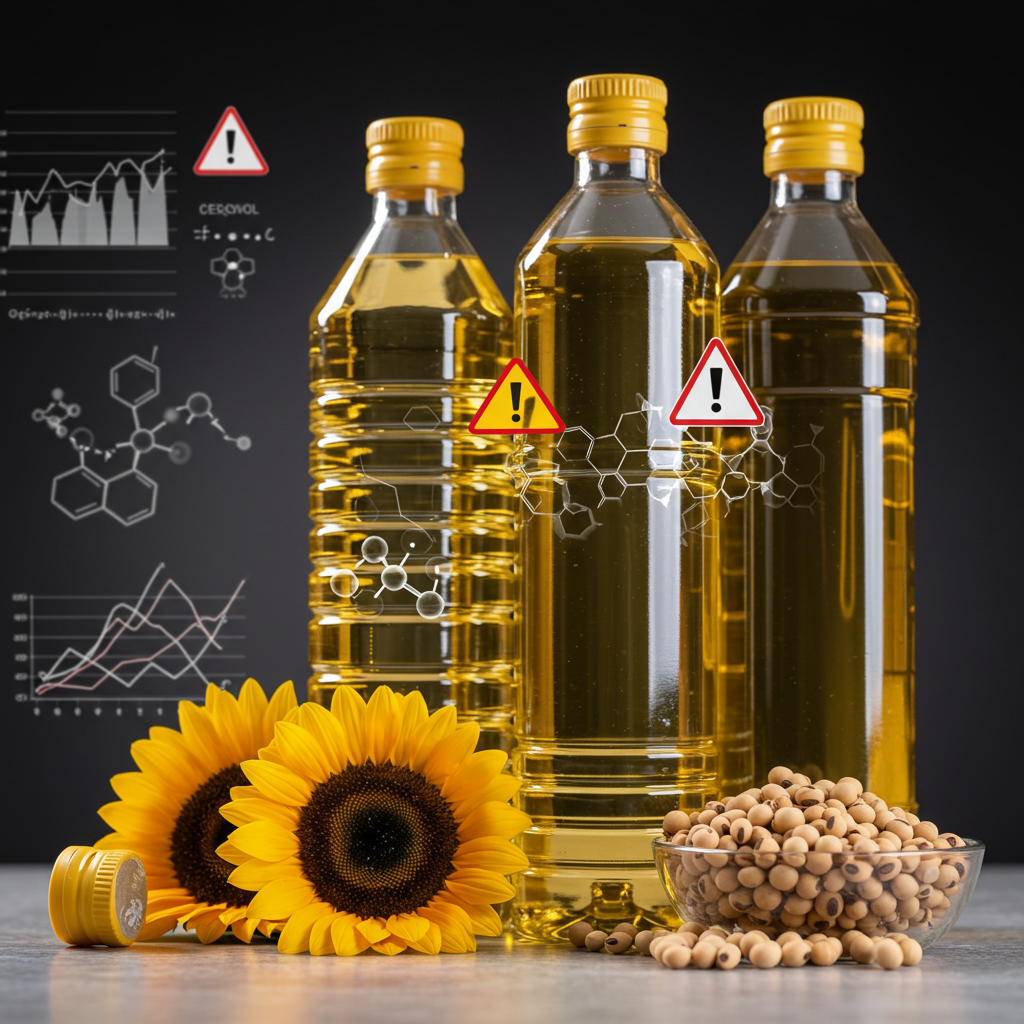Seed oils like canola, sunflower, and soybean oil are kitchen staples worldwide, used in everything from cooking to salad dressings. Yet, in recent years, these unassuming oils have become the target of widespread online controversy, with claims labelling them as “toxic,” “poisonous,” and major culprits behind chronic diseases like heart disease and type 2 diabetes. Some critics even dub certain popular varieties the ‘hateful eight’.
But is there scientific truth to these alarming claims, or are seed oils unfairly demonized? Let’s unpack the evidence.
The Omega-6 Debate: Inflammation or Essential Nutrient?
Much of the criticism centers on the high omega-6 fatty acid content found in many seed oils. Omega-6 fatty acids are polyunsaturated fats (PUFAs) and are essential nutrients, meaning our bodies need them but cannot produce them. They play vital roles in cell membrane structure, brain function, and vitamin absorption.
Initially, some theories suggested that high omega-6 intake could promote chronic inflammation, increasing the risk of various diseases. However, leading nutrition scientists strongly refute this. Dr. Dariush Mozaffarian, director of the Food is Medicine Institute at Tufts University, highlights that controlled trials demonstrate omega-6 fatty acids do not increase inflammation. In fact, new research suggests omega-6 fatty acids are converted into beneficial molecules called lipoxins, which possess powerful anti-inflammatory effects in the body.
Seed Oils and Heart Health: Evidence Points to Benefits
Contrary to the online narrative, numerous studies link consumption of plant oils, including seed oils, to positive health outcomes, particularly regarding cardiovascular health.
A long-term US study spanning 30 years and involving over 200,000 people found that individuals with higher consumption of plant oils had a lower likelihood of dying from cardiovascular disease or cancer compared to those with higher butter intake.
Specific omega-6 fatty acids like linoleic acid, abundant in seed oils, have been shown to effectively lower “bad” LDL cholesterol levels in the blood.
A 2019 study led by Matti Marklund at Johns Hopkins, which analyzed fatty acid levels in the blood of participants from approximately 30 observational studies, found that those with the highest blood levels of linoleic acid had the lowest risk of developing cardiovascular disease over periods up to 30 years. Marklund suggests linoleic acid improves cholesterol and glucose metabolism, reducing risks of CVD and type 2 diabetes. Another analysis of 30 studies similarly linked higher blood linoleic acid to a 7% lower risk of heart disease.
Experts like Christopher Gardner at Stanford acknowledge some confusion arises because omega-6 is involved in blood clotting, which people mistakenly associate only with negative events like strokes, overlooking its essential role in processes like wound healing.
Addressing the Omega 6:3 Ratio Concern
Another common criticism targets the high ratio of omega-6 to omega-3 fatty acids in the typical Western diet, which often exceeds 10:1 or even 50:1, far from the potentially ideal ratios closer to 2:1 or 1:1. While a 2022 WHO review suggested a high omega 6:3 ratio might be associated with increased risk of some conditions like cognitive decline and ulcerative colitis, it ultimately concluded that a high intake of omega-6 from seed oils is unlikely to increase the risk of death and disease overall, emphasizing the need for more high-quality research on ratios.
However, experts like Marklund and registered dietitians suggest a better approach to improving the ratio is to increase intake of beneficial omega-3 fatty acids (found in fatty fish, flaxseeds, walnuts, chia seeds) rather than restricting beneficial omega-6s. Notably, some seed oils like canola oil do contain plant-based omega-3 (ALA).
Processing Methods: Are Chemicals a Real Worry?
Concerns are sometimes raised about the extraction process of some seed oils using chemical solvents like hexane. While hexane is used in the extraction of many vegetable oils, experts point out that commercial refining processes like deodorizing and bleaching are highly effective at removing virtually all residual solvents and other potentially harmful compounds.
Cold-pressing offers a chemical-free extraction alternative, but it’s typically more expensive. Scientists largely consider the minimal potential for residual hexane in processed oils to be a negligible health risk compared to other sources of exposure.
The Ultra-Processed Foods Link: A Case of Mistaken Identity?
Perhaps the biggest source of confusion linking seed oils to poor health outcomes stems from their frequent presence in ultra-processed foods (UPFs), fast food, and packaged snacks. Many studies show clear links between high UPF consumption and increased risks of obesity, diabetes, heart disease, and even certain cancers.
However, nutrition experts emphasize that the health problems associated with these foods are due to their overall composition, not primarily the seed oils they contain. UPFs are typically high in added sugars, sodium, unhealthy fats, refined carbohydrates, and lack fiber and essential nutrients. The problem lies with this combination and the breakdown of natural food structure, not specifically the seed oil component. The context of how seed oils are consumed matters greatly; using them moderately for home cooking (like sautéing vegetables or making dressings) is vastly different from consuming them within highly processed snack foods or fried foods prepared with repeatedly heated oil in commercial settings.
Specific Seed Oils Show Strong Benefits
Some seed oils, like canola and soybean oil, have been extensively studied, providing a robust evidence base for their benefits.
Canola Oil: Contains a balanced mix of monounsaturated fats, omega-6s, and even some omega-3s (ALA). Research indicates canola oil can produce better improvements in blood cholesterol levels than olive oil and may modestly reduce body weight, especially in individuals with type 2 diabetes. It’s also linked to improving blood glucose and insulin sensitivity.
Soybean Oil: Also improves cholesterol levels compared to saturated fats. One large study found a lower risk of death from all causes linked to higher soybean oil consumption.
As Dr. Mozaffarian puts it, “Seeds are one of nature’s most nourishing gifts; a package of beneficial healthy fats.”
A Specific Cancer Finding: Important Context Needed
A recent study published in March 2023 found that linoleic acid could fuel the growth of triple negative breast cancer (TNBC), a particularly aggressive subtype. This lab-based research identified a mechanism where omega-6 supports TNBC cell growth via certain proteins.
While this is important research for understanding cancer biology and potential future treatments, scientists stress it does not mean the general population should avoid essential omega-6 fatty acids. Previous broader studies on omega-6 and cancer risk have shown no association or only a small increase in overall* risk, and cancer is complex with many subtypes. Cutting out essential fats can be detrimental to health. This finding is a specific piece of the puzzle, not a reason to abandon omega-6 entirely.
The Verdict: Science Supports Moderate Use
Ultimately, the scientific consensus, supported by numerous high-quality studies and expert opinions, is that common seed oils like canola, sunflower, and soybean oil are beneficial for health when consumed in moderation as part of a balanced diet.
The widespread online claims about their toxicity are largely unsupported by evidence and often stem from misconceptions, particularly confusing the risks of ultra-processed foods with the oils they contain. Focusing on replacing saturated fats (like butter and animal fats) with unsaturated fats from sources including seed oils, nuts, and seeds, and prioritizing a diet rich in whole foods (fruits, vegetables, lean protein, whole grains) is a far more effective strategy for long-term health than demonizing seed oils.
References
- https://www.bbc.com/future/article/20250530-are-seed-oils-really-bad-for-you
- https://mcpress.mayoclinic.org/nutrition-fitness/the-pros-and-cons-of-seed-oils-and-how-to-incorporate-them-in-your-diet/
- https://www.health.harvard.edu/heart-health/seeding-doubt-the-truth-about-cooking-oils
- https://hsph.harvard.edu/news/scientists-debunk-seed-oil-health-risks/
- https://engagement.source.colostate.edu/are-seed-oils-bad-for-you-registered-dietitian-explains/




